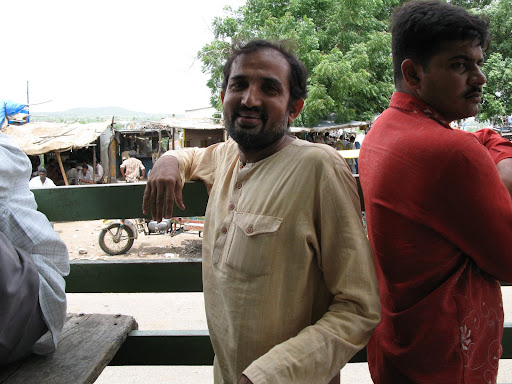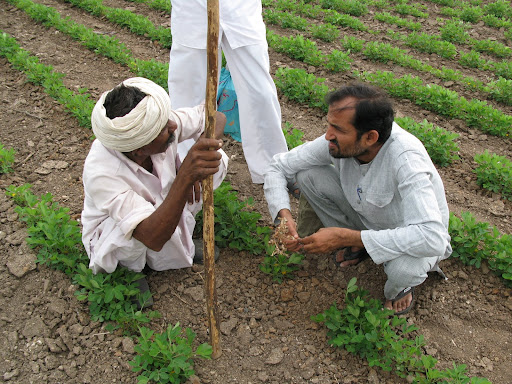 Here is a profile I recently wrote about Kapilbhai for a friend of his who lives in Scotland. The friend will be posting the profile on a website that sells kirpis, of which some amount of the proceeds go toward supporting Jatan and Kapilbhai's activities. The article is meant to just describe Kapilbhai and what he does, so that people buying the kirpi can learn about who/what they are supporting. I think it turned out OK/not great, but it does give a decent idea of what he's like so I thought I'd share it with you all.
Here is a profile I recently wrote about Kapilbhai for a friend of his who lives in Scotland. The friend will be posting the profile on a website that sells kirpis, of which some amount of the proceeds go toward supporting Jatan and Kapilbhai's activities. The article is meant to just describe Kapilbhai and what he does, so that people buying the kirpi can learn about who/what they are supporting. I think it turned out OK/not great, but it does give a decent idea of what he's like so I thought I'd share it with you all.In case you also want to read more about Kapilbhai and his legendary family of social workers, Nipun and Guri did a profile of Jagdishdada, his father, when they stopped at the ashram during their walking pilgrimage a couple years ago.
======================================
The Kirpi is a simple yet efficient traditional Indian hand tool. It has a serrated edge and its shape allows for a firm grip. It can be used for weeding or hoeing, and is equally effective in a hobby garden in Europe or on a small subsistence farm in rural India. The Kirpi is adaptable, reliable, simple, and effective. Kapil Shah, the Managing Director of Jatan Trust in Gujarat, India, fits this description perfectly. He is a human Kirpi. In fact, rearrange and substitute a couple letters, and you get the same word. For over twenty years, Kapilbhai has been working for the causes of sustainable agriculture and farmer’s empowerment in India, juggling work and relationships in the academic, policy, non-profit, and grassroots village arenas. And also like the Kirpi, Kapilbhai’s achievements are a tribute to the traditions of his Indian ancestors and the Gandhian principles with which he was raised since birth.
Jatan means “care”, and it is caring for the millions of marginal farmers on marginal land throughout rural India that is the primary focus of Kapilbhai’s activities. This focus has taken him to many places, to meet with many people, to work in many ways. He organizes workshops, seminars, writes articles, and contributes to journals and periodicals on organic farming. Besides thinking and writing about organic farming, he is an active participant in organic agriculture both through an acre plot at the Vinoba Bhave Ashram where he resides and also in rural areas with farmers. You might see him on one day, as I have, giving a speech about the current state and future directions of organic farming in India to a crowded hall of professors and researchers at a top agricultural university; and the next day he is squatting over a row of groundnut plants
 in a remote farm field in rural Gujarat with a smallholding farmer, giving him advice on his recent pest problems. He has managed to hear the perspectives from both worlds, and he is equally fluent in both languages. This is the unique characteristic of Kapilbhai, and makes what he does have such a high degree of difficulty. He is a promoter of organic farming, but for him this means extending his reach all the way from the most advanced academic researchers to the smallest and most isolated farmers. Despite working within this broad spectrum, one can get a sense of where his heart lies when he says that his favorite classroom is not in any of the distinguished buildings of Anand Agricultural University where he earned a Gold Medal with an M.Sc. in Plant Breeding and Genetic; it is Dhedhuki, a remote agrarian farming community which he has been visiting regularly for the past three years.
in a remote farm field in rural Gujarat with a smallholding farmer, giving him advice on his recent pest problems. He has managed to hear the perspectives from both worlds, and he is equally fluent in both languages. This is the unique characteristic of Kapilbhai, and makes what he does have such a high degree of difficulty. He is a promoter of organic farming, but for him this means extending his reach all the way from the most advanced academic researchers to the smallest and most isolated farmers. Despite working within this broad spectrum, one can get a sense of where his heart lies when he says that his favorite classroom is not in any of the distinguished buildings of Anand Agricultural University where he earned a Gold Medal with an M.Sc. in Plant Breeding and Genetic; it is Dhedhuki, a remote agrarian farming community which he has been visiting regularly for the past three years.Kapilbhai defines Sajiv Kheti, which literally translated means "living agriculture", as more than just farming free of chemicals and GMOs. He sees organic farming as a means for social justice for small farmers, a way to bring back the notion of the farmer as a steward of the land, responsible for its well-being by supporting all the organisms on it and not exploiting its natural resources. In exchange for and appreciation of the farmer’s efforts in looking after their land in this way, the community is then compelled to provide the farmer with market demand. In this way, Sajiv Kheti is a philosophy of life which considers not only environment and health as in organic farming, but society and a community’s relationships with the land, and between producers and consumers. My understanding of this difference was brought home when Kapilbhai told me that it wasn’t enough for consumers to choose organic produce because it is healthier for them. "It should be enough that they are willing to pay a premium for their health, this is a good and strong motivation," I replied with surprise. He responded, "If this is the only reason, then the consumer will be happy to see the small farmer substituted for agribusiness, which with its superior resources can deliver the same organic produce at a reduced price."
Kaplibhai does not hide his bias toward the small farmer. In fact, he is not afraid to introduce the bias in any situation, even when some objectivity may be more expedient. His dedication is admirable, and it is reflected in the people with whom he interacts and in the esteem the community holds the organization he manages, Jatan. At Amidhara, the organic produce retail outlet that Jatan runs, customers will tell you that they aren’t interested in any sort of organic certification or special fair trade labels on the products to have trust that what they are buying is chemical-free. “Jatan is my label”, one customer said, who visits Amidhara daily to see what fresh vegetables or grains have come in. This loyalty and enthusiasm is typical of customers who frequent Amidhara, and it reflects the spirit that Jatan has instilled.
Through Kapilbhai’s leadership, Jatan is a leading co-ordinating body between consumers, farmers, government agencies and universities, and, plays an advocacy role in establishing a platform for coordinating the organic movement at the national level. Locally, it has been facilitating closer interaction between these groups through the organization of workshops and conferences. During June 2000, Jatan organized a training course on bio-control of insect pests with the help of Anand Agricultural University (AAU) and in August of the same year it organized an exposure program for undergraduate students of AAU with the help of ‘Sarwangin Gram Vikas Mandal’ at Mangrol. A training course on organic farming was organized in Anand Taluka with the help of Gujarat Agricultural University in September 2000. Jatan also organized a massive state-level convention attended by more than 800 people, of which 400 were organic farmers in May 2001, jointly with a local NGO called Human Technology Forum, Sandarbha and AAU. About 30 small and poor farmers registered for the meeting by donating five kilograms of any grain they had produced. In the same year, Jatan led a statewide Abhiyaan (campaign) against the distribution of illegal BT Cotton in Gujarat and organized awareness programs about the consequences of chemical farming.
Under Kapilbhai’s leadership as chief editor, Jatan also releases a quarterly magazine on organic farming, named “Graam Jatan”. It is the first on organic farming printed in the Gujarati language, and features information on soil care and nutrition, composting, green manuring, vermiculture and mulching. The newsletter also contains articles promoting opposition to genetic engineering, the use of seed developed by genetic modification, the philosophy of organic farming, network news, and health hazards of chemical food. Kapilbhai is the Gujarat state representative for Agricultural Renewal in India for Sustainable Environment (ARISE), a network of organic farmers, environmentalists, voluntary workers and scientists at national level, of which Vandana Shiva is one of the co-founders.
Broadly speaking, Kapilbhai is currently working towards developing a Sajiv Kheti "package of technology and markets" to offer marginal farmers that is compelling enough for them to consider converting from chemical-based agriculture. Acknowledging that farmers today have increased earnings expectations and will only make changes if financial incentives are available, Kapilbhai is working to put into place a system of programs including organic farming training and education on techniques and best practices, market and price premium access, a localized certification system, and support from the agricultural academic community to create the conditions for improved knowledge of and increased earnings through organic farming. The road, however, is difficult and begins with educating farmers on the risks of chemical farming both financially and environmentally. It also involves communicating the potential of Sajiv Kheti through success stories of past and current organic farmers, in-person visits to other farms, and the latest academic research.
Kapilbhai prefers for Jatan not to be called an NGO, which may have associated connotations of bureaucracy, dependence, ineffectiveness, and exclusiveness. Instead, he likes for it simply to be considered a "volunteer organization" which requires the continued efforts of many people besides himself to continue its progress forward. Humble words from the man who gives speeches, writes books and articles, organizes conferences, educates farmers and consumers, all with no salary drawn from Jatan Trust. And on many mornings, he can still be seen sweeping the organic garden at the Vinoba Ashram. All in a day’s work for the Kirpi of India’s organic farming movement.
Hi Neil-
ReplyDeleteI have been reading your blog, since you started. Hope you are having good time. It is hard in the begining and it will take some time. It is mind set, it gets easier and easier each time. Have fun.
Babumama
Hello Neil,
ReplyDeleteA very well written and expressed article on Jatan and Kapil bhai. They and the organic farming are synonymous and stand for each other.
Jatan is doing very inspiring work of educating everyone who needs it.
His untiring and accurate grip on the grass root problems and issues of Indian farming systems are very motivating. Thank you for writing and sharing this article.
Renu Mittal
Food security for both the present and future generations depends on environmental preservation. GREEN is cognizant of this and values environmental preservation through sustainable organic farming practices. The three essential elements of the connection between agriculture and ecology—seed, soil, and water—are given priority in our activities.
ReplyDelete